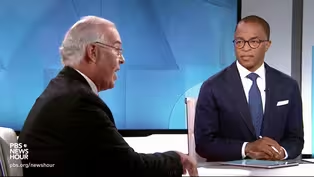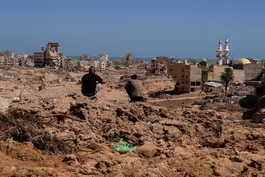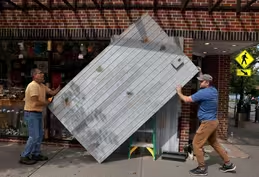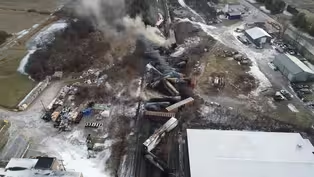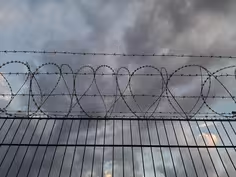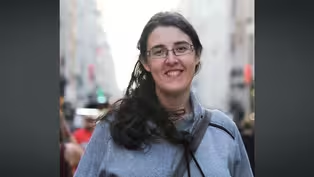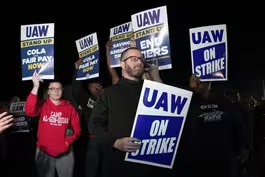
Iran tightens security before anniversary of woman's death
Clip: 9/15/2023 | 7m 23sVideo has Closed Captions
Iran tightens security before anniversary of Mahsa Amini's death
One year ago, a young Iranian woman died in police custody after she was arrested for taking off her headscarf, or hijab, required under the laws of the Islamic Republic. Huge protests followed, led by women. Tehran special correspondent Reza Sayah has the story of some of the women who participated in the protests and others who did not.
Problems playing video? | Closed Captioning Feedback
Problems playing video? | Closed Captioning Feedback
Major corporate funding for the PBS News Hour is provided by BDO, BNSF, Consumer Cellular, American Cruise Lines, and Raymond James. Funding for the PBS NewsHour Weekend is provided by...

Iran tightens security before anniversary of woman's death
Clip: 9/15/2023 | 7m 23sVideo has Closed Captions
One year ago, a young Iranian woman died in police custody after she was arrested for taking off her headscarf, or hijab, required under the laws of the Islamic Republic. Huge protests followed, led by women. Tehran special correspondent Reza Sayah has the story of some of the women who participated in the protests and others who did not.
Problems playing video? | Closed Captioning Feedback
How to Watch PBS News Hour
PBS News Hour is available to stream on pbs.org and the free PBS App, available on iPhone, Apple TV, Android TV, Android smartphones, Amazon Fire TV, Amazon Fire Tablet, Roku, Samsung Smart TV, and Vizio.
Providing Support for PBS.org
Learn Moreabout PBS online sponsorshipAMNA NAWAZ: The U.S. today imposed new sanctions on Iran, explicitly designated on the grim one-year anniversary of the death of a young Iranian woman in police custody.
Mahsa Amini was arrested for taking off her headscarf, or hijab, required under the laws of the Islamic Republic.
She never left custody.
Huge protests followed, led by women with a common refrain, "Women, life freedom," that shook Iran for months.
Tehran special correspondent Reza Sayah has the story of some of the women who participated in the protests and others who did not.
REZA SAYAH: September 2022, angry protests led by women gripped the streets of Tehran following the death of Mahsa Amini.
The 22-year-old died in police custody after she was arrested for allegedly breaking Iran's Islamic dress code for not wearing her headscarf, or hijab.
One year later, we spoke to some of the women who say they peacefully took part in the protests.
They asked us not to reveal their identities.
Sara is a 54-year-old aid worker.
Narguess is 43, a dental assistant.
NARGUESS, Dental Assistant (through translator): It was a good feeling.
It felt like everyone was somehow united.
It was a feeling of fearlessness.
I'm usually a fearful person, but I felt strong.
We felt like we had to defend our rights.
SARA, Aid Worker (through translator): It was just like someone shot an arrow attached to a string, and that arrow and string went through and united everyone who was in the streets.
There were religious people, non-religious, men, old and young.
They all bonded just like a big family.
REZA SAYAH: At the protests, many women removed their hijab in a show of defiance.
For Iran's clerical rulers, the hijab is a pillar of the Islamic Republic.
To protesters, it was a symbol of an oppressive government.
By removing the hijab, they said, no more.
NARGUESS (through translator): It was from that moment that I completely removed my hijab, which should be your right, your choice.
You can choose this, and we chose to be without the hijab.
REZA SAYAH: As protests spread, authorities intensified their crackdown.
In the months that followed, more than 500 people died, including nearly 70 security officers.
Thousands were arrested, among them journalists and activists.
The Iran protests became one of the biggest news stories of 2022, with international headlines depicting Iran's women taking on Iran's oppressive leaders.
ZEINAB MARZOUGHI, Journalist (through translator): For me, as a journalist, I think that they wanted to produce a bad impression of the leadership.
REZA SAYAH: But Zeinab Marzoughi, a journalist for one of Iran's conservative newspapers, says coverage of the protests was one-sided and incomplete.
Zeinab Marzoughi grew up in a conservative family in Iran's Khuzestan province, where, for many, the hijab is a part of everyday culture.
She says she too was deeply upset at Amini's death, but was struck by how the demands of women in the more liberal capital, Tehran, were so different than what women want in her conservative hometown.
ZEINAB MARZOUGHI (through translator): I often walked by security forces in the clashes, and I thought, do you know what the main concern is for women in Khuzestan, while you're highlighting the hijab as the main concern for all women?
For me, the difference in views is remarkable.
I think to myself, people are fighting one another for one thing here, while we want something very different there.
REZA SAYAH: Zeinab says what most Iranian women want are better lives, better jobs, the ability to save money for a secure future.
ZEINAB MARZOUGHI (through translator): The hijab has become a symbol in civil protests against the erosion of society, our economic situation.
When people see that the leadership is sensitive to the issue of the hijab, then they push their button and remove the hijab.
If livelihood improved, then maybe people would have an easier time dealing with the hijab.
REZA SAYAH: And that's maybe the most important, maybe the most surprising point we heard over and over again from Iranian women.
Yes, these were anti-hijab protests that shook Iran last year, but many Iranian women say their main demand is a better economy.
SARA (through translator): The hijab was a weapon that was used, but the hijab was not the only concern for any of these women.
NARGUESS (through translator): When I talk to everyone around me, the hijab is not their main concern.
The main concern is the cost of living, inflation.
SARA (through translator): People are so concerned with income and putting bread on the table, both men and women, that they can't even think of anything else.
NARGUESS (through translator): If our situation improves and everything is great, I am personally ready to wear the hijab.
REZA SAYAH: For many Iranians, the economic situation is not improving, and the fallout of the protests may have made things worse.
Inflation, unemployment, the plummeting value of Iranian currency, and more Western sanctions are battering the economy.
Many Iranian women make a living with digital businesses on social media, but with the government tightening Internet restrictions and blocking Instagram in response to the protests, many smaller start-ups are going under.
Two years ago, business was booming for this Instagram business owner.
This year, she delivered a teary goodbye.
BUSINESS OWNER (through translator): This will be the last time you hear my voice and see me on my page.
Your support and friendship were very important to me.
I often said, you became my second family because you were always with me.
REZA SAYAH: One year after the death of Mahsa Amini, the mandatory hijab law is still in place, and Iran's leadership still denies Amini was beaten to death.
At a recent news conference, a judiciary official described the unrest as a hybrid war instigated by the West.
KAZEM GHARIBABADI, Judiciary Official (through translator): What is a hybrid war?
It means you have destruction, riots and disorder that is sown not just in the streets, but in prisons, universities and schools.
Social media is used to support this hybrid war.
The news media, whether Farsi language or not, outside of Iran assists in implementing this strategy.
Spy agencies are involved too.
We witnessed all of this in these recent events.
REZA SAYAH: But in the streets of the capital, Tehran, more women openly walk without the hijab.
NARGUESS (through translator): The women who wore the hijab before still wear the hijab, but the women who didn't believe in the hijab are no longer wearing it.
You see the morality police, but they don't dare say anything to you, even though you hear threats of fines.
But women are standing up for what they want.
REZA SAYAH: What Iranian women say they want are better lives.
It's up to the Iranian government to deliver.
Failure to do so will likely fuel the discontent that sparked Iran's women-led protests and still brews one year later.
For the "PBS NewsHour," I'm Reza Sayah in Tehran.
Brooks and Capehart on Biden's impeachment inquiry
Video has Closed Captions
Clip: 9/15/2023 | 11m 29s | Brooks and Capehart on Biden's impeachment inquiry and tensions among House Republicans (11m 29s)
Devastation grips Libya after catastrophic flooding
Video has Closed Captions
Clip: 9/15/2023 | 3m 16s | Devastation grips Libya after catastrophic flooding (3m 16s)
New Wrap: New England braces for impact of Hurricane Lee
Video has Closed Captions
Clip: 9/15/2023 | 4m 52s | New Wrap: New England braces for impact of Hurricane Lee (4m 52s)
Ohio town looks for answers months after train derailment
Video has Closed Captions
Clip: 9/15/2023 | 7m 38s | Ohio town searches for answers months after toxic train derailment (7m 38s)
Reports shows staggering spike in Louisiana prison deaths
Video has Closed Captions
Clip: 9/15/2023 | 5m 5s | Reports shows staggering spike in Louisiana prison deaths (5m 5s)
Sister searches for Princeton student missing in Iraq
Video has Closed Captions
Clip: 9/15/2023 | 5m 44s | Princeton student’s sister urges action months after suspected abduction by Iraqi militia (5m 44s)
UAW strikes after deadline with automakers expires
Video has Closed Captions
Clip: 9/15/2023 | 5m 27s | United Auto Workers strike after deadline expires between the union and automakers (5m 27s)
Providing Support for PBS.org
Learn Moreabout PBS online sponsorshipSupport for PBS provided by:
Major corporate funding for the PBS News Hour is provided by BDO, BNSF, Consumer Cellular, American Cruise Lines, and Raymond James. Funding for the PBS NewsHour Weekend is provided by...
